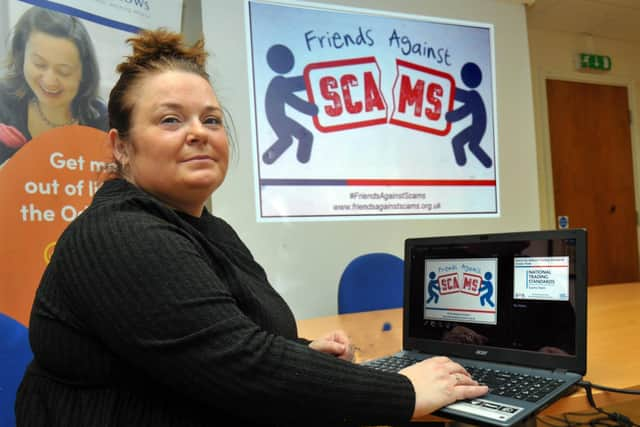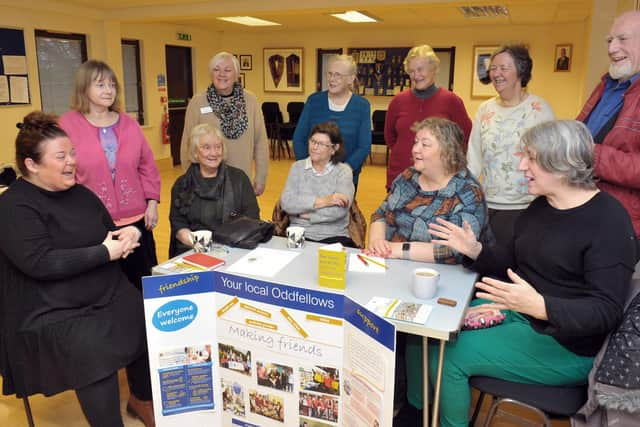'The scammers don't discriminate' warns trainer with advice on staying safe
and live on Freeview channel 276
Helen Bullock, who works for the Oddfellows friendly society, stressed that anyone can become a victim because the criminals involved "don't discriminate".
"They're all very charming, they're all very intelligent," she said. "They will charm your socks off, they will be able to think on their feet. If you come up with some excuse, they will just come up with another."


Advertisement
Hide AdAdvertisement
Hide AdShe is now one of more than 1,700 SCAMchampions across the country helping other potential victims to spot the warning signs.
Among the first talking points in the sessions she hosts are the stereotypes about who might fall foul of a scam.
Helen said: "It's about breaking down those barriers. It's not just because you're elderly - the scammers don't discriminate.
"My husband lost all our wedding money because he gave our banking details in a text message."


Advertisement
Hide AdAdvertisement
Hide AdThe message claimed to be from his bank and asked that he confirm his password and details. Once he did, the fraudsters used the information to withdraw £6,000 from his account that the couple had saved up for their wedding day.
It was only because the bank accepted its own measures should have been tighter that they were reimbursed.
As social co-ordinator for the Oddfellows in Meanwood, Helen had heard firsthand from the society's older members about the worries they had about scams and how new technologies might expose them to greater risk.
"More and more when you were talking to members, they were becoming targeted," she said.
Advertisement
Hide AdAdvertisement
Hide AdHaving previously worked for a bank, she had a better idea than many about the potential signs that someone was being targeted by fraudsters.
But it was through the Friends Against Scams programme, run by the National Trading Standards Scams Team, that she got the tools to teach others.
Now she runs free sessions not only for the society's members but also any members of the public who are keen to learn more. They have included everyone from police officers and priests to care home workers and people concerned about older family members.
Advertisement
Hide AdAdvertisement
Hide Ad"The Friends Against Scams session is about looking out for yourself and other people," Helen said. "The more people you talk to about scams, the less likely others are to become a victim.
"If I say that I got a phone call about investing in a diamond mine in Nigeria, because I've spoken to you then you're less likely to fall for it."
Fraudsters will often prey on those who might be isolated or lonely, repeatedly posting scam mail to their home or calling them up on a regular basis with offers and deals.
"They will target people who want that purpose of getting up in the morning, replying to a letter, going to the post office," Helen said.
Advertisement
Hide AdAdvertisement
Hide Ad"A lot are lonely. When people are ringing them, it's the only phone call they get. That social isolation isn't just for older people, it can be anybody.
"The most harrowing thing if you go through something like that, is the criminal will then sell on your details. You're basically put on a victim list."
During one of the first sessions she ran, one man shared how he had been targeted by someone who knocked on his door to say his property had loose roof tiles.
He told the doorstep caller that he had no cash but was taken twice to the bank to withdraw money.
Advertisement
Hide AdAdvertisement
Hide Ad"It was the bank staff who actually called the police and they've prosecuted him," Helen said. "It's why it's so important for everybody to be aware."
Another woman spoke about the way a relative living in a remote area near Scarborough had been targeted.
"When they looked at her bank accounts, there was money going out left, right and centre," Helen said.
The free training sessions cover examples of scams and how to spot them, whether they involved the internet, social media, mail, phone calls or people turning up at your door.
Advertisement
Hide AdAdvertisement
Hide AdThey also explore some of the basic measures you can take to prevent yourself and how to report any concerns.
Also in crime: Five ways you can support our Stop The Scammers campaign
Helen said: "One lady said 'I keep getting these leaflets through the door'. If you're worried about those, you can send them to Trading Standards."
One of the simplest pieces of advice is to step back from a situation so you have got time to think things through.
Advertisement
Hide AdAdvertisement
Hide Ad"Step back, be in control, step away from that phone call," Helen said. "Don't feel you have to be so British and polite. Put the phone down, slam the door in their faces.
"I tell people to lie. My mum, if she receives phone calls, she'll say her son-in-law is a policeman, an IT consultant or he works for British Gas. If the scammers know you've got someone in your corner, often they will back off.
"If someone turns up wanting to do your garden, tell them you don't have any money. Make them then you're not on your own and vulnerable. Go seek advice from people you trust."
Friends Against Scams also offers a free online training session, which takes around 20 minutes to complete.
